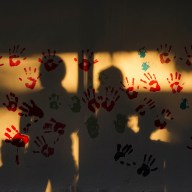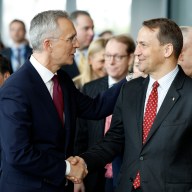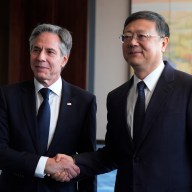By Stephen Farrell
JERUSALEM (Reuters) – At 96, Mohammad Mahmoud Jadallah has razor sharp memories of the founding of Israel in 1948, the event that has shaped his life and that of his fellow Palestinians.
The event whose 70th anniversary is celebrated by Israel is lamented by Palestinians as the Nakba, or “Catastrophe” – the displacement of hundreds of thousands of Palestinians.
And on May 14, three days before he turns 97, he will witness what many Palestinians like him see as another setback to their dream of statehood: the United States will open its new embassy in Jerusalem on land that Jadallah said was once farmed by his village.
“We have lived a life of Nakbas. We have never experienced happiness or tranquillity,” he said in the living room of the family home, near Sur Baher’s imposing Omari mosque.
The new embassy will lie on a hillside across the valley from Sur Baher, on what he said was once village land growing figs, grapes and wheat. In the decades since Israel was created, it has been enveloped in Jerusalem’s municipal boundaries.
Israel calls Jerusalem its undivided capital. Palestinians say the U.S. decision to move its embassy there undermines their demand for East Jerusalem as the capital of their future state.
“Decisions are being made on our behalf internationally. As of right now, we can’t change anything. We are of no use, no one asks for our opinion,” he said.
Born on a hilltop overlooking Jerusalem in 1921, just four years after Palestine was captured by the British Empire from the Ottoman Empire, he watched the early waves of Zionist Jewish immigrants arrive in the hills around his village.
As a young man, he worked as a waiter in the King David Hotel in Jerusalem’s Old City, just two miles (three km) from his village – and was there in 1946 when the Jewish paramilitary group Irgun blew it up, killing more than 90 people.
He fought under doomed Arab commanders in lost battles against Jewish forces during the struggle for control of Jerusalem as the modern state of Israel was born.
As a middle-aged man he watched as Israeli troops captured his village during the 1967 Six Day War. Israel later expanded Jerusalem eastward to include Sur Baher and other neighboring villages, annexed the area, and has occupied it ever since.
And as an elderly man, Jadallah embraced Yasser Arafat in Jericho in the 1990s when the veteran Palestinian leader returned from exile to set up the Palestinian Authority.
Arafat was known to Palestinians as “Al-Khetiyar” – The Old Man. But, such is Jadallah’s longevity, he was 10 years his senior when they met and Jadallah has outlived the leader of Palestine Liberation Organisation (PLO) by more than a decade.
KING DAVID TO NAKBA
Jadallah lives at the end of a zig-zagging series of narrow streets next to a patch of olive trees. On shelves and walls of his neatly appointed living room is a painstakingly assembled trove of sepia photographs, paintings and plaques – pictures of him in military uniform as a young man, and of him with Arafat.
Known to everyone in the village, he has 10 children and has had to compile a chart to keep track of his 134 grandchildren and succeeding generations.
Although 70 years of Nakba dominates his recollections, perhaps the most extraordinary memory is of the day he had just arrived for work at the King David Hotel, narrowly escaping death from Irgun explosives hidden inside milk churns.
“The kitchen had a special door, which was used to bring inventory in, and it was where workers used to get in,” he said.
“They entered from there in a pick up car. The car had cans of milk, we saw it with our own eyes,” he said.
When the blast went off it “cut the room in half,” killing everyone inside, he said, including a colleague from Sur Baher.
“There was a state of panic. People were running in the dining room and in other places in the hotel. There was a lot of confusion in the hotel in general.”
Around him events moved quickly. The following year, in 1947, the United Nations General Assembly agreed a plan to partition Palestine into Arab and Jewish states.
Jewish leaders accepted the plan, which gave them 56 percent of the land. But the Arab League rejected it.
Realizing war was coming, Jadallah went to Syria in 1947 for military training. He returned to serve in the Arab Liberation Army, a volunteer force opposing the partition plan, and later fought with the Jerusalem guerrilla leader Abdel Qader Husseini.
“We were all rebels fighting,” he recalls. “There were fighters, mujahideen, and we were part of it. A group of young men were chosen, and I was chosen with another guy to represent Sur Baher.”
On hearing Husseini had died at the battle of al-Qastal, west of Jerusalem, he knew defeat was likely.
“The situation changed for us, the morale changed,” he said. “The day the British withdrew and the Israeli flag was put on the building of the High Commissioner, the Nakba started.”
From that day to now, he has never had hopes of peace.
“Peace will not be achieved because we are weak. The Palestinian people have been manipulated throughout history,” he said.
“All we want is to live in peace and safety on our land, in our homes. We don’t want anything else. We want peace. We want to live where we were born.”
(Reporting by Stephen Farrell; Editing by Edmund Blair)


















